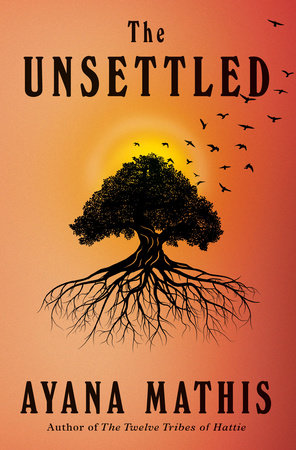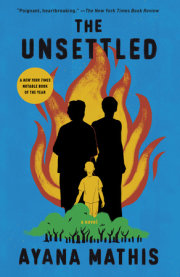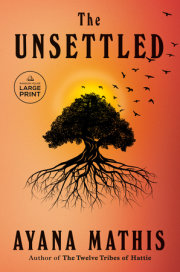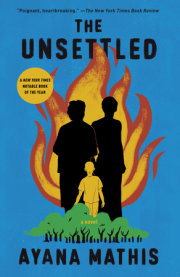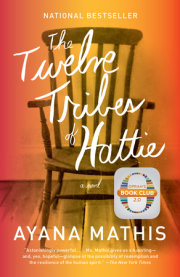1985
Philadelphia
Cherry Street
It tinseled down on Ava Carson clutching her two suitcases in front of the Cherry Street Intake Center for the Homeless. Ava cried out and dropped her bags. The latches unlatched when they hit the pavement and the suitcases popped their guts like a melon thrown from a great height. Visions are not real, or they aren’t real yet, but they do terrify.
“Toussaint!” Ava called out.
He was standing right behind her, just as he had been before the vision struck: a little boy of ten, small for his age, with both hands around the handle of his own suitcase. There they were, on a late August morning: mother and son, with three cases between them and a black trash bag bulging with their belongings.
“What were you doing on that street? Why did you . . . ?” Ava paused. She was shrieking, she realized. “No,” she said. “Nothing.”
She had never heard of Ephraim Avenue. Hallucinations. This is the sort of thing that happens when you haven’t slept for days and you’re so exhausted that your vision goes black at the sides where the peripheral ought to be.
Ava got to to her knees and scrabbled at the things on the ground: pajamas and her silk top with a tie at the collar, and a couple of nice skirts she had managed to pack, Toussaint’s good Buster Brown school shoes and his sequined Michael Jackson glove, a few Avengers comic books. She stuffed them back into the suitcase fast as she could, only they wouldn’t fit like they had before.
“Ma! You have to fold them. Ma, they’re just falling out again.”
Brisk feet stepped around them. A pair of scuffed black lace-up shoes stopped next to one of the suitcases. A woman’s head lowered into view.
“You need some help, miss?” she said.
Ava shook her head.
“Let me help you.” Her hands swung down and hovered over Ava’s things, cracked palms, ashy knuckles, dirt under the nails.
“No!” Ava said. “I mean, that’s all right.”
“Mmph,” the woman said. Her heel went down on a pair of slacks as she walked away.
Inside, Cherry Street smelled of sweat and stale junk food and hair.
The waiting room was big like the DMV, with rows of plastic chairs bolted to the floor. The man at intake kept calling Ava and Toussaint up to the window to ask a single question: Names? All right, sit down. ID? Okay. Take a seat. It was grim, but it was busy. The people working there had an urgency about them, like they were fixing things, phones pressed to their ears and their desks piled with folders. In the corner of the waiting room a skinny lady rubbed Vaseline on her kid’s elbows like her life depended on it. That was a comforting sight. One monkey don’t stop no show, like the saying goes. She squeezed Toussaint’s hand. “Maybe we won’t have to wait too long,” she said.
But they did wait. An hour passed, then two. Afternoon came, or Ava guessed it was afternoon because the sun turned white and the room was broiling. The intake man called them up again to give Ava a stack of forms attached to a clipboard. When they turned back to their seats, a go-head-say-something kind of woman was sitting there next to a kid with his arm deep in a bag of Doritos. Not a free chair left in the place. There wasn’t anywhere to be but leaned up against the wall with their bags at their feet. The thick air pressed on Ava’s chest and stomach till she heaved a gob of sick into a used wad of tissues she picked up from the floor. A woman sitting at the end of a nearby row frowned and looked away. Who is going to help, Ava thought, if there’s nobody here but these women and their kids, all of them poor as cracks in the floor? People who ain’t got nothing can’t do nothing, like her mother used to say.
“Ma, you want me to hold it?” Toussaint asked. Ava couldn’t balance the clipboard against the wall and the papers kept slipping to the floor. Her boy put his hand on her arm. His eyes were big as plums and flitted from one thing to the next: a nut-brown baby slung over a shoulder, a little girl who kept undoing her barrettes till her mama popped her one, a lady shaking her papers at the intake man. Ava swallowed back another wave of sick and focused on the forms.
The forms had questions like: Last address. 245 Turnstone Pike, James Creek, New Jersey. Next of kin. N/A. Marital status: Married. Separated. Emergency contact: N/A. What circumstances led you to seek assistance at Homeless Services? Two weeks ago, my husband Abemi Reed threw us out of our home his home in New Jersey.
Then she wrote: Last night me and Toussaint were sitting on a bench in a bus shelter across the street from a lady’s house out in the Northeast. She had a pitcher of iced tea on her table. It was dark in the bus shelter, then the streetlight came on right over us and we were lit up. That woman in her kitchen saw us so I didn’t think we should stay there. And we were so tired. I spent nearly all the money on a motel. In the morning my son asked where we’d go after we left there. Are we going to spend the night here again, is what he said. I got him an egg sandwich at the McDonald’s down the street. We sat in the air-conditioning and watched some kids on the slide in the Playland. I had put aside enough for bus fare, so that no matter what, we could get somewhere. We used the bus fare and came here on the El.
Ava ran out of space and had to write down the margins. She knew that wasn’t the kind of answer they wanted, but she had to tell somebody. The man at the intake window was talking on the phone and didn’t even look up when she pushed the clipboard through the slot. She stood with her arms at her sides and waited. After some time, he glanced up at her and sighed.
“Come on, miss. Take it easy.” He picked up the clipboard. “You can’t cry in here. You need to calm— Gloria! Come out here cause this lady is . . . Don’t put your hands all on the glass, miss.”
Gloria was noisy coming out of a side door: “Okay. You got to be easy or we can’t . . .” But it wasn’t just Ava—half people in there were crying, or trying not to. Wouldn’t any of them look each other in the eye though.
Gloria assigned Ava and Toussaint to the Glenn Avenue Family Shelter. She gave them carfare—tokens and paper transfers, not cash. Three hours later they were back out on the street. The skinny-boughed Center City trees drooped in the heat, and the business ladies’ hair-sprayed dos were limp. Ava and Toussaint dragged their suitcases and trash bag down Broad Street to the subway. They took turns hauling their things down the subway stairs: Toussaint guarded the stuff and Ava took two suitcases down. Then switch. Then switch. People stared but nobody helped. A dark collar of sweat spread around Ava’s neck. Toussaint’s eyes were glazed and his lips were whitish and dry. The other passengers kept their distance, even though they were sweating too, even though some of them were taking up too much space with shopping bags and laundry carts. People are funny like that.
Ava and Toussaint got off the subway, took two buses, and at last found themselves trudging through the streets with their bags. The directions said walk four blocks to Tulpehocken. Turn left. They walked five blocks, then six. Mosquitoes buzzed in their ears.
“Ma? Ma! Is this it?” Toussaint asked of every building they passed.
They arrived at an intersection. Around the corner, a one-story gray building sprawled in the middle of the block, big and sad-looking the way government buildings are. There was a tumult in the U-shaped driveway in front, and a tangle of women and children; so many you’d think kids and mothers were the only people bad things happened to. Some of the mothers needed to take out their rollers, and some of the kids had stained T-shirts, and some of them needed haircuts. Ava didn’t notice the boys with their pants neatly ironed or the women with their hair and nails done up nice. All she knew was she couldn’t walk in there. But Toussaint was slumped against a tree. He couldn’t take another step, or not many more.
“Stay close,” she said, picking up the suitcases. She got a grip on the trash bag even though it dug into her wrist and her shoulder strained in its socket. “Stay right by me.” A woman by the door tried to say something, maybe hello or maybe she wasn’t even talking to them. Ava couldn’t call up any words in response. Just inside the door a tubby security guard stood behind his desk and said, “Who goes there?” with the kind of smile that could have been a leer.
“You want to go run around, champ?” he said to Toussaint while he checked Ava’s paperwork. He told her they had a nice playground for the kids, with monkey bars and a slide. Ava hated him for standing there and for the kitchen and bedroom waiting for him when he got off work, and for all his talking and talking. His name was Melvin. Ava wanted to slap his face. “You can go out there for a little bit before they close it up for the night.” If his stomach weren’t cramping, Toussaint would have liked to climb on the jungle gym and hang off the bars and scream like he was scared of being upside down but really he’d just be screaming. He looked at his mother to see if maybe . . . but her face was clenched like a fist.
“Mondays,” the guard was saying, shaking his head. “It’s crazy here Mondays.” He jerked his thumb in the air behind him. Probably was going to be a minute; everybody was gone for the day except Miss Simmons.
“She been backed up since morning,” he said. “You can leave your stuff in there.” He pointed to what looked like an empty office. Ava shook her head. She would not leave their things in an unlocked room. She would not let Toussaint run with these raggedy children. Wasn’t there anything to eat, for her son, she wanted to know.
“Well, miss, this ain’t Pizza Hut,” he said. Then: “I’m playing. I’m just playing. Dinner’s over, but you can ask Miss Simmons. They usually got something for people that get here late.”
Ava and Toussaint sat on the chairs in the hallway and tried to keep their suitcases out of the way. A woman sitting across from them rolled her eyes. Like there was anything they could do about having stuff. Like that woman wasn’t sitting there with her fat legs spread open like a man, cow chewing a wad of gum, Ava thought. The hallway was dim and too warm. The knobs of Ava’s spine pressed into the hard back of the metal chair. Toussaint fidgeted.
“Don’t scratch,” she whispered. “We don’t have . . . don’t scratch.” He had a raw-looking spot just above his elbow.
Toussaint sat on his hands. “It’s not so bad, Ma,” he said. “They put up all these decorations. See?”
The corridor was plastered with construction-paper cutouts, the kind kids make at school. And a big smiling apple with a slogan written across the middle. A food pyramid with pieces of bread that had legs and little hats. But there weren’t any windows, and the cinder-block walls that ran down to a dead end were taped over with official-looking signs and notices.
“See?” he said again.
Snatches of conversation floated out to them from the pay phone near the guard’s desk: “And what about Miss Jeanie? What she doing? She been over?” Ava hit at a mosquito on her leg. Down the hallway coins clattered, followed by a thunk when the soda machine dropped the can down the shoot. The pay phone rang every instant there wasn’t somebody talking on it.
“Don’t scratch, Toussaint.”
“Don’t you scratch. You’re scratching,” he said. Ava’s thighs burned with mosquito bites. She itched so bad it felt like panic. She jumped up from the chair, then sat down again.
A lady with her ends curled into a pageboy led them into an office and introduced herself as Miss Simmons. She sat down and moved her mouth around while Ava’s thighs burned. Miss Simmons had perfectly mauve nails, oval, and she tapped them against the desk while she talked. No drugs and no alcohol and no men. Tap. Counseling was available. Tap. Every resident must actively seek employment. Ava should sign up at the job center by the end of the week. Failure to follow the regulations—strictly!—would result in immediate termination of their stay. No questions asked. Tap tap. Ava rubbed her legs through her jeans. Was Miss Carson tired? Miss Simmons asked. Had she used any substances? She looked a little out of sorts. Drug-treatment counseling was available. Mealtimes were strictly observed. No food in the rooms. No drugs and no alcohol and no men. Every resident must be out of the facility by nine a.m. on weekdays; residents can return for lunch. Curfew nine p.m. unless special permission was received. Section 8 vouchers were available if they found housing on their own. Residents should make every attempt to find housing.
Ava’s eye twitched. She was so tired she could have lain on the floor. Miss Simmons led them on a tour of the facility. The TV room is locked at nine p.m. The door to the right is one of five family bathrooms, each with five shower stalls, sinks, and toilets. Was Miss Carson all right? She should come for a mental health assessment at one p.m. tomorrow. She should come for her general intake at ten a.m. They’d finish the tour tomorrow. The boy looked a little tired. They descended a half flight of stairs and went down a long corridor to arrive at room 813. Miss Simmons produced a key from the pocket of her blazer. No drugs. No alcohol. No men. Then she was gone.
The walls in room 813 were dingy mint green. High rectangular windows faced a yard of trampled grass, beyond which a parking lot was just visible across a busy street. Ava’s sandals stuck to the gummy linoleum. The room smelled of dirty mops and all the bodies that had lived in it: kids with flaky rashes and years of women giving their armpits a quick rub in the little sink in the corner—how many women over how many years?—and dirty clothes and an ammonia stink over all of it. Toussaint stepped forward. Ava put her arm across his chest to stop him from walking farther into the room. A wooden desk stood at the back with a couple of plastic hard-bottomed chairs alongside. A metal shelf and mirror were mounted on the wall over the chipped, shallow sink. There were two single beds on metal frames pushed against opposite walls. A half-dead roach on the mattress. Toussaint leaned against her arm.
“Sit on the chair, honey,” she said. “Don’t sit on that mattress. Don’t touch anything. We can’t stay here. We’re not staying here.”
After a few hours, the traffic on Tulpehocken slowed. Ava and Toussaint had not moved from the chairs by the battered old desk. A baby cried somewhere down the Glenn Avenue hallways. A wall clock ticked into the silence. Ava looked up to check the time only to discover that the hour hand quivered over the 10 like a fluttering eyelid. Ava climbed up on the chair, then onto the desk. She grabbed the greasy clock with both hands and tugged. “Come on,” she said out loud.
Toussaint jerked awake and looked around red-eyed.
“Ma?”
Ava climbed down. Toussaint sat with his head leaned on his palm, but his elbow kept slipping on the desk. “Ma,” he said. “Ma, can I please lay down?”
“Soon, honey.”
“I feel sick, Ma. I think I need to lay down.”
“I know, baby. I know. We’ll lay down soon.”
The next minute he was sprawled across the desk again. Ava bent over him and rested her cheek on his head. His hair was damp. He did need to lie down. But not here. Only there was nowhere else to go. She had, they had, no place and so they were in this place instead of a park bench or a subway station. She leaned on the desk to steady herself. Maybe we could . . . a thought leapt across her brain like a cat over a wall. It might have been a good idea, the one that could save them, but Ava was too slow to catch it.
Toussaint yelped like he was being kicked in his dreams. Okay. Okay. Ava stood. She didn’t have anything to clean the mattress so used both sets of sheets to make the bed that didn’t have the roach. Her back ached, but she managed to heave Toussaint up from the chair with both arms and guide him to the bed. She draped him over the sheets like Abraham’s Isaac.
Ava angled her chair toward the bed to guard her son against anything creeping out of the corners to crawl over him or lay its eggs in his ears. She shivered with exhaustion but as soon as she closed her eyes, she felt legs skittering on her ankles. The overhead light buzzed and the room was suddenly bright white and washed out, like an overexposed photograph. Another vision coming down on her. Or the Holy Ghost or her pop’s spirit streaming through the fluorescent light on the ceiling. Whatever it was calmed her. Ava rested her head against the wall and after some time, she slept.
Copyright © 2023 by Ayana Mathis. All rights reserved. No part of this excerpt may be reproduced or reprinted without permission in writing from the publisher.

